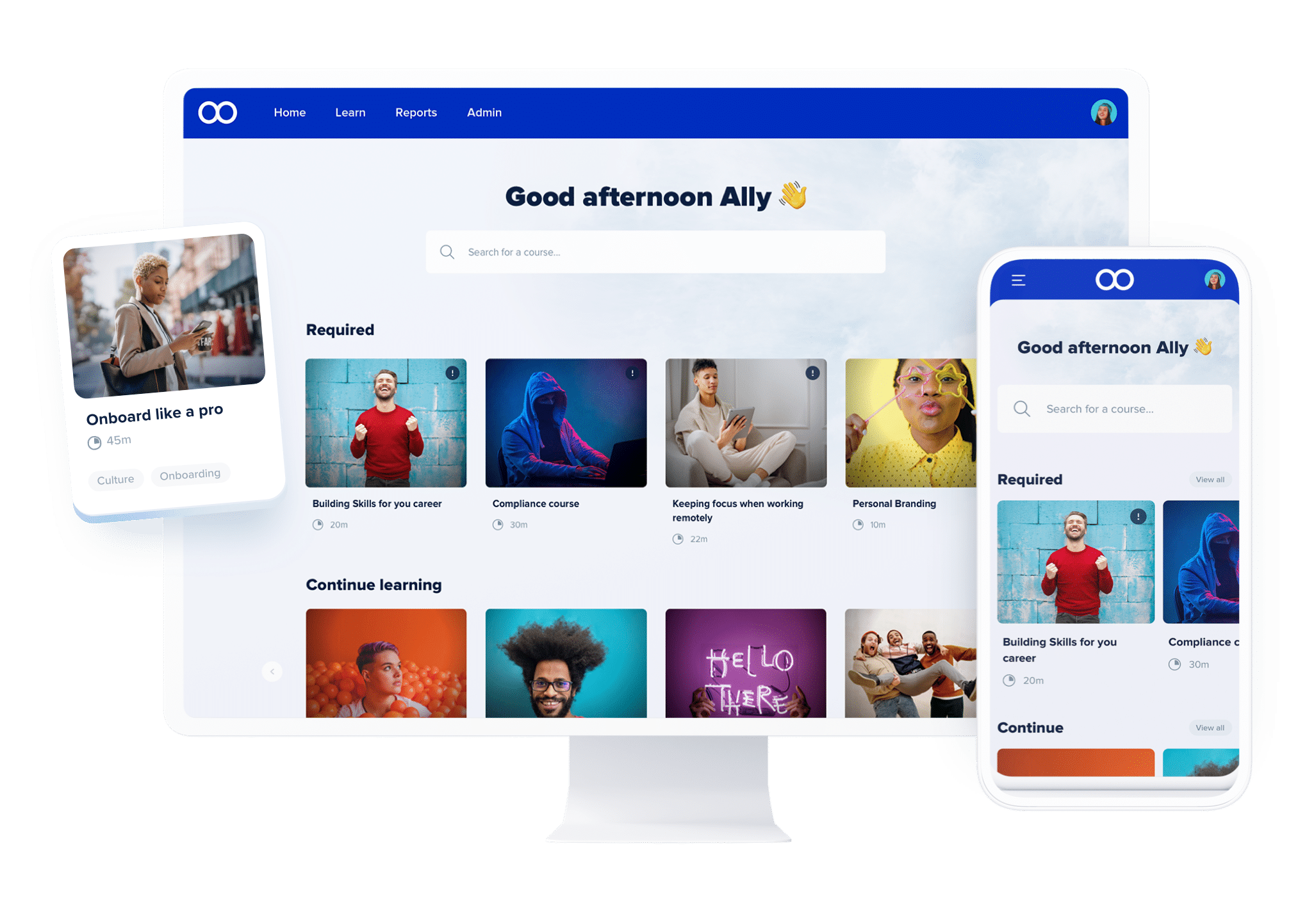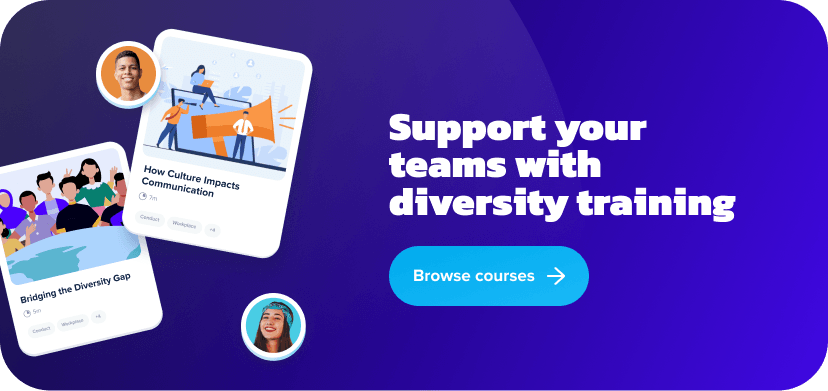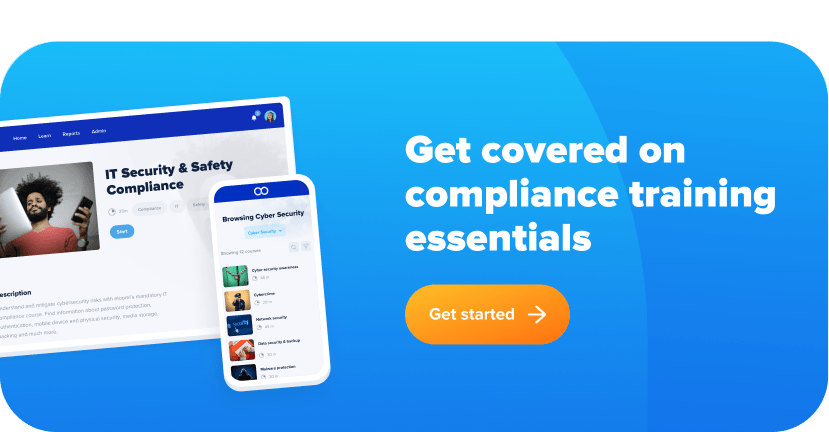What it is: Diversity, equity, and inclusion (DEI) training seeks to improve equality in the workplace by helping employees embrace and celebrate what makes everyone unique.
Why it matters: It builds awareness of differences between employees and how each person got to where they are today, seeking to help employees embrace the unique, and possibly differing, perspectives of their colleagues.
Increasing demand for DEI compliance training
Diversity, equity and inclusion (DEI) have attracted enormous attention from employees, leadership teams, chief compliance officers, and HR professionals. According to a Glassdoor survey, 76% of U.S. employees and job seekers say a diverse workforce is an important factor when evaluating companies and job offers. 63% think their employer should be doing more to increase the diversity of its workforce. Accordingly, organizations want to respond to social, political, and economic issues and create truly diverse teams and inclusive workplaces that resonate with employee values. In this article we will explain the role of DEI and how DEI training can positively impact your business.
Although these values may be reason enough by themselves, they are not alone in driving the increasing demand for DEI. While “more than 200 studies show how diversity in business leads to greater levels of innovation, customer service, employee engagement, and long-term growth” (The Josh Bersin Company), research has documented that the most diverse teams and companies outperform their less diverse counterparts (McKinsey & Company).However, despite the huge urge for DEI, only 22% of companies believe they are recognized by their employees, customers, or suppliers as leaders in DEI. Just to make it clear, the stats show that employees and management alike want to improve DEI.
The importance of diversity in the workplace
Creating a diverse workplace is so important, but it’s often overlooked for most organizations. Diversity is not only a moral imperative, but also a strategic advantage for any organization that wants to succeed in today’s competitive and dynamic world.
Here’s why:
- Greater diversity can inspire creativity and innovation, as people from different backgrounds and perspectives can offer new ideas and solutions to problems. This can lead to better products, services, and customer satisfaction.
- Workplaces that embrace other cultures can enhance the employee experience, as people can learn from each other, appreciate different cultures and values, and foster a sense of belonging and respect. This can be strategic to improve employee engagement, retention, and productivity.
- Diversity can increase the market reach and reputation of the organization, as it can appeal to a wider range of customers, partners, and stakeholders. A diverse workforce can also help the organization understand the needs and preferences of different segments of the market and tailor its strategies accordingly.
What are the main four types of diversity?
Internal diversity – These are characteristics of people that you can’t change. Think of things like race, age, ethnicity, national origin, and similar distinguishing characteristics.
External diversity – These are characteristics which may be changed, if the individual is open and willing, even if extremely difficult. This includes religion, spirituality, citizenship, geographic location, family status, and personal experiences.
Organizational diversity – This relates to the work each person does in your company. It includes things like work experience, job duties, management status, and tenure.
World view diversity – This looks to the unique lived experiences of each person. No two people experience the same path in life and these differences shape who we are, influence our world view, and our outlook on life.
Is diversity, equity and inclusion training required?
Diversity and inclusion training in the workplace is not part of mandatory compliance training required for any private employer in any US state. However, some state legislatures are considering certain requirements, and some state courts have even strongly suggested diversity training could ease some workplace issues and disturbances. Nevertheless, DEI training remains fully at your discretion.
Equally, DEI training is not mandatory across the EU, though it is a topic of growing concern and strongly recommended. The EU has been progressively advocating for more inclusive work environments through various directives and initiatives aimed at combating discrimination and promoting equal opportunities. Many member states have introduced national guidelines and frameworks that encourage employers to implement DEI practices voluntarily. The expectation for organizations to engage in DEI training is consequently rising, making it a strategic priority for many businesses across the EU.
You may, however, require your employees to attend your DEI training. If your company gives DEI training, it’s strongly suggested that you require each new hire to complete the training within 60 days and that you provide a company-wide annual update.
Compliance Recommendation: While most discussions center around DEI training for employees, you should also provide a separate training to your managers that teaches them how to uphold DEI practices and handle allegations of poor workplace behavior and potentially inappropriate discussions.
What is DEI training & what does it include?
Diversity and inclusion training helps every employee recognize workplace diversity issues, like those affecting underrepresented groups. The training will explore everyone’s biases and belief systems, helping to acknowledge discrimination, even when it’s unintended. Ultimately, the training will teach your team how to stand up to discrimination and contribute to an inclusive workplace culture.
Baseline diversity training
All diversity training should include, at an absolute minimum, baseline training that helps employees understand and recognize the differences among them. Baseline diversity training will cover:
- Anti-racism
- Anti-sexism
- Gender identity and sexual orientation education
- Cultural sensitivity training
- Discussions on a multigenerational workforce
- HR compliance
- Awareness Training

Awareness training
Awareness training helps employees understand everyone must be treated equally in the workplace. This is the equity part of DEI. Whatever a person’s background and lived experience, they should be treated with respect and not marginalized because of their background or identity. Awareness training helps employees understand that someone else’s life experiences may have been different, not better, not worse, than their own.
When complete, awareness training seeks to help employees:
- Make decisions together
- Solve problems without excluding anyone from the conversation
- Celebrate differences
- Remove prejudice
Deeper diversity training
This training builds on the baseline diversity training, giving employees the tools they need to recognize their own biases and how to change them.
Deeper diversity training helps employees to:
- See their own unconscious biases
- Develop ways to change their biases
- Build an inclusive culture and workplace
Management DEI training & diversity audits
Management of DEI training is a topic that’s covered in full in a dedicated article focused on diversity training for managers. Diversity audits are a task your HR team must focus on to ensure the training aligns with your company’s direction.
Before implementing any training, you need to have a deep understanding of where you’re starting from. Through a diversity audit, your HR team takes the temperature of the company, getting a pulse for what DEI initiatives should be explored.
These audits will help your company to:
- Assess peer relationships
- Understand the working environment at present
- Identify existing discriminatory practices
These audits should occur before any training is implemented and at least annually. Making this a regular company practice will give your employees trust that you hear them and take proper action.
Plus, it allows you to modify your annual DEI training to address any new issues which may have arisen internally over the past year.

Employee attendance & acknowledgement
Your training must be documented. You don’t have to record the training session—though that is a best practice – but you must ensure every employee has been trained. Remember, you’re not required to offer DEI training, but you should and, if you do, make it mandatory.
Whether you’re giving DEI training to a new hire or you’re conducting annual update training with your entire team, have every employee sign an acknowledgement form that they have received the training. Keep these forms in the employee’s personnel file so you always have them on hand.
Annual updates
One item that many businesses do poorly is providing DEI updates. We recommend giving this training to your employees once per year. You also must make sure any new hires receive training during their first few weeks of employment.
Updating your DEI training every year is crucial to ensuring you remain compliant and your business has an affirmative defense to any potential legal action. Remember, the state your business operates in or a state where you have a remote employee could enact a new law requiring this type, or a similar type, of training. You must stay on top of of these legislative changes if you’re going to stay out of harm’s way.
Top 3 reasons diversity and inclusion training is essential in your workplace
We’ve all worked with people we didn’t like or someone who just rubbed us the wrong way. That alone isn’t a big problem and certainly one that can be overcome. But if we didn’t like that person because of their race or their background, that’s a different story. That’s a lack of cultural diversity, even if it stems from an unconscious bias.
The differences in each of us is what makes workplaces thrive. The diversity each employee brings to the table gives your company the benefit of having different perspectives to help solve unique problems. It also lets your employees see how someone else might think slightly differently.
1. Increases employee engagement
Employee engagement is crucial for a company’s survival. If your employees are disengaged, your company’s productivity will suffer and so will your bottom line.
But engagement is so much more than just pizza parties and happy hours. In fact, according to Gallup, an engaged workforce outperforms similarly situated companies by almost 150 percent.
How does diversity increase employee engagement? Because your workforce learns to be more accepting of others and the perceived differences between everyone. Having an inclusive workplace makes for a more exciting and, ultimately, engaging environment.
2. Improves employee retention
When employees don’t feel included, they’re less likely to stick around. The higher a company’s turnover, the harder it is to hire new employees. It’s a vicious cycle.
Diversity and inclusion training in the workplace helps employees feel a sense of belonging. Everyone wants to be part of a group and, when employees feel like they belong at work, not only are they more likely to be more productive, they’re also more likely to be loyal to your organization.
Improving your retention rates also reduces your company’s cost to hire a new employee. DEI training can make this a win-win.
3. Provides positive change
The baseline diversity training includes a basic education and awareness of diversity and the history of working in this country. For too long, high paying jobs were only available to those who set up the system. It worked for them but it didn’t work for so many others.
Even unconsciously, many companies today want to make positive changes, but they often don’t know how. Diversity training can show your employees how to improve hiring practices, increase diversity in promotions, and many other key items that promote positive changes in the workplace.

The learning imperative: continuous learning and its role in diversity
DEI training initiatives in the workplace foster empathy, open-mindedness, and cultural competence (Training Industry). By encouraging employees to participate in ongoing DEI training programs, organizations create a culture grounded in inclusivity. Customized learning paths, as highlighted by industry experts (eLearning Industry), cater to individual learning styles and preferences, ensuring that every employee has access to relevant, engaging, and impactful learning experiences.
In this context, eloomi’s personalized learning paths add significant value to DEI training initiatives. By offering curated content and interactive modules tailored to individual needs, eloomi enhances the effectiveness of DEI training, making it a dynamic and transformative experience for employees.
This personalized approach deepens employees’ understanding of DEI principles. It also encourages them to actively apply these learnings in their daily interactions, thereby fostering a truly inclusive workplace where everyone feels valued and respected.
How to implement DEI training with eloomi
The first step is to have a genuine desire to improve your company. Leaders at work today are expected to push for real diversity, to be role models, and to set the expectation for a culture that values every employee, regardless of their background. Diversity training offers your company the chance to be a leading catalyst for positive change. A noble effort in its own right, it can also have positive effects on your business.
It’s important that you take proactive steps to ensure your employees are properly trained on required and recommended training necessary for them to do their jobs. That’s why at eloomi, we partner with expert content providers to curate quality training. Get in touch or browse our course collections to see just how easily you can implement DEI compliance training today.







